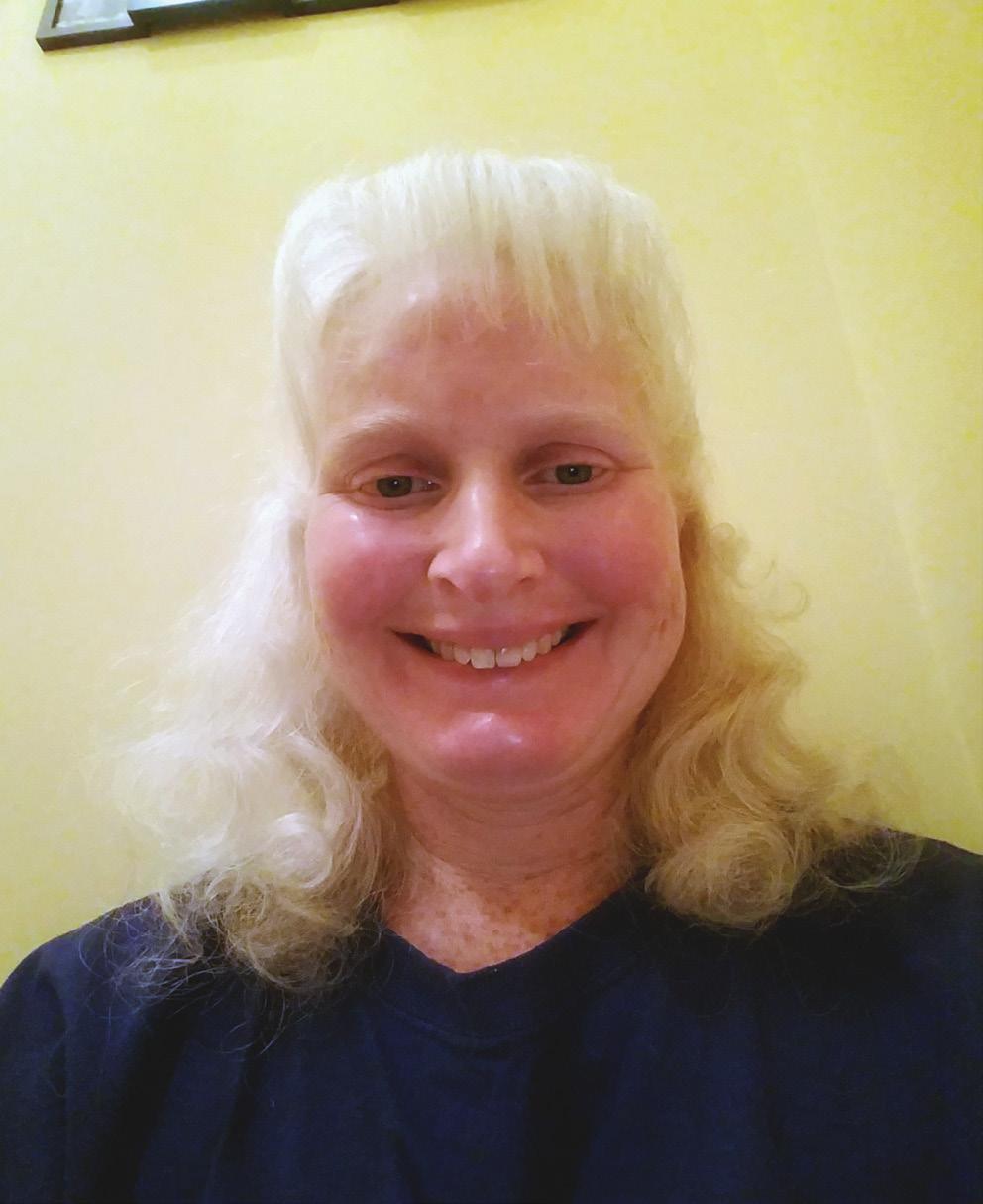
4 minute read
Patient Story
Kate Sproul
In the fall of 2017, I spat out blood every time I brushed my teeth. I had sores on my gums, and it hurt when I ate hard or spicy foods. In August and September of that year, I had some dental work done, and the dentist had not seen anything wrong with my gums. When I went back to the dentist, he guessed that I had either gingivitis or lichen planus, and he gave me some chlorohexidine to rinse with. When that did not help the problem, he sent me to a periodontist. After both oral and topical steroids failed to heal the sores, I was sent to another periodontist who did a biopsy. I was diagnosed with pemphigus vulgaris (PV) on March 27, 2018.
Advertisement
I hadn’t ever heard of PV. None of my family or friends had it. I did a Google search, and www.pemphigus.org came up immediately. I was incredibly relieved to find out that not only did other people have this disease, but many of them were also helping other people get through it. First, I read the concise and scientific description of PV, and I was grateful to learn exactly what I was dealing with. I then read some of the stories of people who had the disease for years before they were correctly diagnosed and was thankful for my own relatively fast diagnosis. Then I searched the Find a Doctor map to find a physician in the Nashville area. I spent quite a bit of time exploring the website, absorbing what information I could, and making a note to look at the rest of the information when I felt less overwhelmed.
A couple of days later, I received an email from an IPPF peer health coach asking if I had any questions or needed help. I was so impressed and grateful to get that email! Even though I was recently diagnosed and unsure about what to ask, I was so happy to know that there was someone who was ready to talk to me.
The first IPPF Patient Education Conference that I attended in 2018 was a fabulous experience. Even though most in attendance were diagnosed with a serious rare disease, everyone was very happy and welcoming, including the patients who got up in front of all of us and shared harrowing stories about their lives with P/P before they were properly diagnosed. I was amazed at the courage of the people who told us the personal details of being so ill, and I was astounded that they were walking around and looking incredibly healthy. It was a sobering look at what I could have experienced and a joyful realization that even if my condition worsened, there were people there who had recovered and been in remission for 10, 15, or even 20 years.
Besides real-life stories, we were given a lot of practical advice that I would never have heard from my doctor, such as staying away from toothpastes, shampoos, conditioners, soaps, etc., with sodium laurel sulfate; choosing a Waterpik® with different speeds so that the lowest setting can be used on your gums; using a soft child’s toothbrush; and using Coban™ wrap instead of band-aids.
I also heard, formally and informally, that there is not a specific diet plan that will cure P/P, but that each individual has to determine what works for them. Some people can eat onions at any time, while others will get a flare if they even taste one. The peer health coaches suggested keeping a food diary to determine which foods made our symptoms worse. This type of advice showed us what we could do to help control our disease besides just taking our medications.
I have participated in several patient education webinars, and I have learned something from each one. It is great to be able to ask doctors about medications and their side effects. Also, just listening to some of the questions from other patients has provided me a more complete picture of the various aspects of my disease. On one of the webinars, the peer health coaches answered questions about more practical advice on a variety of topics. Food and diet were discussed quite a bit, as well as tattoos. Their advice was not to get one since we have skin diseases! Since the start of the pandemic, there have been webinars with doctors who are studying COVID-19 and how it affects our community. This demonstrates how much work the IPPF does to give everyone up-to-date information about things that affect our health, including what we can do to keep ourselves healthy during this pandemic.
The best part about the IPPF is that they are ready to help at any time. Peer health coaches share their stories—some of them much sadder and more uncertain than mine—and they do their best to make sure that the next person has a quicker diagnosis, better treatment, shorter amount of time on steroids, and a faster return to a life without blisters. They have created an environment in which each person who goes through either of these diseases and gets to the other side wants to turn around and help someone behind them.
I encourage everyone who has P/P to get involved with the IPPF. You can connect with others who understand your experience as a patient. You can keep up with the latest clinical trials and approved medications. And you can learn what practical things you can do to improve your health.

Kate Sproul has worked for the Nashville Zoo for the last 19 years, taking care of cattle, sheep, donkeys, goats, alpaca, and kangaroos. She lives in Nashville, TN with her cats.









